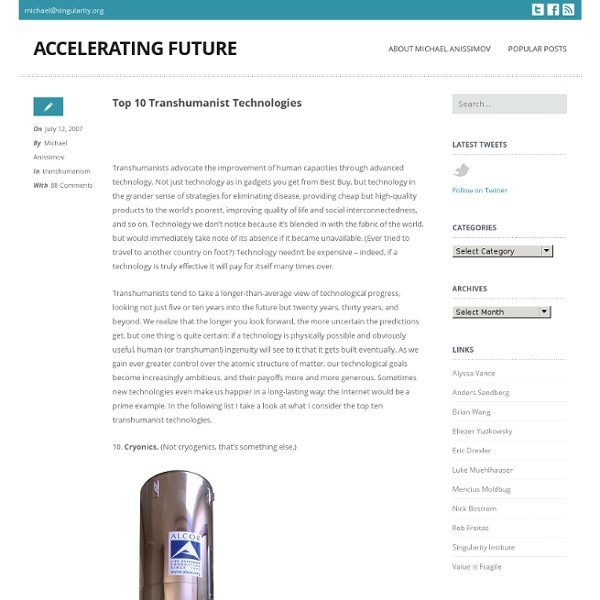Three Major Schools
(Originally appeared on the Machine Intelligence Research Institute blog, September 2007.) Singularity discussions seem to be splitting up into three major schools of thought: Accelerating Change, the Event Horizon, and the Intelligence Explosion. Accelerating Change: Core claim: Our intuitions about change are linear; we expect roughly as much change as has occurred in the past over our own lifetimes. But technological change feeds on itself, and therefore accelerates. Change today is faster than it was 500 years ago, which in turn is faster than it was 5000 years ago. Our recent past is not a reliable guide to how much change we should expect in the future.
Neanderthals ate shellfish 150,000 years ago: study
Neanderthal cavemen supped on shellfish on the Costa del Sol 150,000 years ago, punching a hole in the theory that modern humans alone ate brain-boosting seafood so long ago, a new study shows. The discovery in a cave near Torremolinos in southern Spain was about 100,000 years older than the previous earliest evidence of Neanderthals consuming seafood, scientists said. Researchers unearthed the evidence when examining stone tools and the remains of shells in the Bajondillo Cave, they said in a study published online in the Public Library of Science. There, they discovered many charred shellfish -- mostly mussel shells -- left by Neanderthals.
The Acceleration of Acceleration: How The Future Is Arriving Far Faster Than Expected
The Acceleration of Acceleration: How The Future Is Arriving Far Faster Than Expected This article co-written with Ken Goffman. One of the things that happens when you write books about the future is you get to watch your predictions fail.
Evolution of evolvability
Evolution of Evolvability This paper shows how evolution tunes the content and frequency of genetic variation to enhance its evolvability. Genetic evolution is not random or entirely blind.
Infinity Point Will Arrive by 2035 Latest
Eray Ozkural December 23, 2013 During writing a paper for the 100 Year Starship Symposium, I wished to convince the starship designers that they should acknowledge the dynamics of high-technology economy, which may be crucial for interstellar missions.
Ray Kurzweil Speaking at Geek Park Innovation Conference, Beijing, China - Futurism
Ray Kurzweil Speaking at Geek Park Innovation Conference, Beijing, China Share This Tweet This Join .wp-social-login-connect-with{}.wp-social-login-provider-list{}.wp-social-login-provider-list a{}.wp-social-login-provider-list img{}.wsl_connect_with_provider{}
Salim Ismail on Singularity University [Transcript]
Endeavor is pleased to make public the following transcript from a presentation at the 2011 Endeavor Entrepreneur Summit in San Francisco. The event, which assembled over 450 entrepreneurs and global business leaders, featured dozens of entrepreneurship-related presentations by top CEOs and industry experts. Overview: Salim Ismail, successful angel investor and entrepreneur, former vice president of Yahoo! and current executive director of Singularity University discusses what Singularity University is and does and how technology will radically change the future. Bio: Salim is a successful angel investor and entrepreneur – his last company, Angstro, was acquired by Google in August 2010.
The Futurist: Are You Acceleration Aware?
The single most necessary component of any attempt to make predictions about the future is a deep internalized understanding of the accelerating, exponential rate of change. So many supposed 'experts' merely project the rate of progress as a linear trend, or even worse, fail to recognize progress at all, and make predictions that end up being embarrassingly wrong. For example, recall that in the early 1970s, everyone thought that by 2000, all of the Earth's oil would be used up. It has not, and the average American spends fewer hours of wages on gasoline each week than in 1970.
Can We Control Our Technological Destiny—Or Are We Just Along For the Ride? - Singularity HUB
“Man becomes, as it were, the sex organs of the machine world…”– Marshall McLuhan A standard assumption of technological progress is that new innovations are born in our mind, and we humans choose which of those visions to bring into existence. We imagine stuff, we want stuff, we build stuff, and repeat.
The Unique Challenges of Exponential Leadership
Salim Ismail The term “exponential” refers to a sequence or process by which desirable results are achieved. As Salim Ismail explains in his eponymous book, written with Michael S. Malone and Yuri van Geest, an exponential organization (ExO) “is one whose impact (or output) is disproportionately large — at least 10 times larger — than its peers because of the use of new organizational techniques that leverage accelerating technologies.” Such organizations pose unique challenges to those who aspire to lead them. In Chapter Eight, Ismail, “ExOs for Large Organizations,” he discusses six defining characteristics and I hasten to add that, with only slight modifications, they could also describe other leaders in small-to-midsize organizations.



